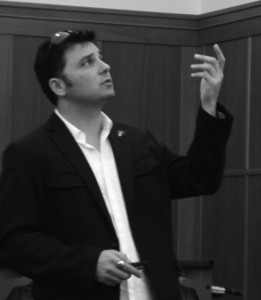
Julian Adolf
Linfield College hosted Pete Hatemi, professor of political science, microbiology and bio-chemistry at Pennsylvania State University, to lead a series of lectures attempting to connect the political science discipline to that of the natural sciences. The first of these lectures was about the neurobiology of political violence, held Feb. 25 in T.J. Day Hall.
When talking about the variety of research results that were available for public viewing, there were several themes that took shape. The general topics looked at were why many Middle Eastern countries have people who turn to extreme violence as the only solution. The team relied heavily on biology to solve these issues. Some of the main biological reasons that are believed to cause these extreme emotions are centered in hormones, the limbic system and genetics.
Hatemi mentioned that much of the world shares more in common at a genetic level than one would suspect. This caused some people in the audience to speculate about violence in other parts of the world.
Most of his recent work has been with the Defense Department. Hatemi is part of a group of researchers who look at how political violence takes root. Much of the research has been connected to how emotions play into acts of terrorism in the Middle East, especially Bengazi as of the last months.
The research Hatemi is taking part in with violence is just beginning. He commented that the team has many more years to go before it is near completion. This field of study is new and underfunded. While there is still much work to be done, one conclusion that can be drawn from the lecture is that violence is in some way encoded into who we are as people, and if someone is drawn to extreme violence, there is little that can be done to change them.
Hatemi’s lecture displayed that there is much opportunity for interdisciplinary study in research. By combining the fields of science, psychology and politics, scholars are able to gain a bigger picture of topics such as violence.
“What brought me on this path had a lot to do with my time in the service. It [the army] is a huge social experiment,” Hatemi said when asked why he became interested in such an obscure topic.
Not only is Hatemi a professor at Penn. State, he also works with universities around the world. He has worked at the Virginia Commonwealth University in the U.S., the Institut for Statskundskab at Syddansk Universitet in Denmark, the University of Sidney and Queensland Institute of Medial Research in Australia.
Recently, Hatemi was awarded the Erik Erikson Early Career Award. This award honors people in the academic community who have received their Ph.D in the last decade and is a leader in the political psychology field. Much of Hatemi’s work focuses on social psychology and its interactions with politics.
The nature of his work has left much of it to be classified and a great deal of it will never be published. He commented that this has made it hard because of academic requirement that his college has in publishing work, but his is still proud of what he does.
“Your work is very interesting and interdisciplinary with a big I,” said Patrick Cottrell, assistant professor of political science, highlighting its importance as the lecture’s closing statement.
Julian Adoff/Multimedia editor
Julian Adoff can be reached at






